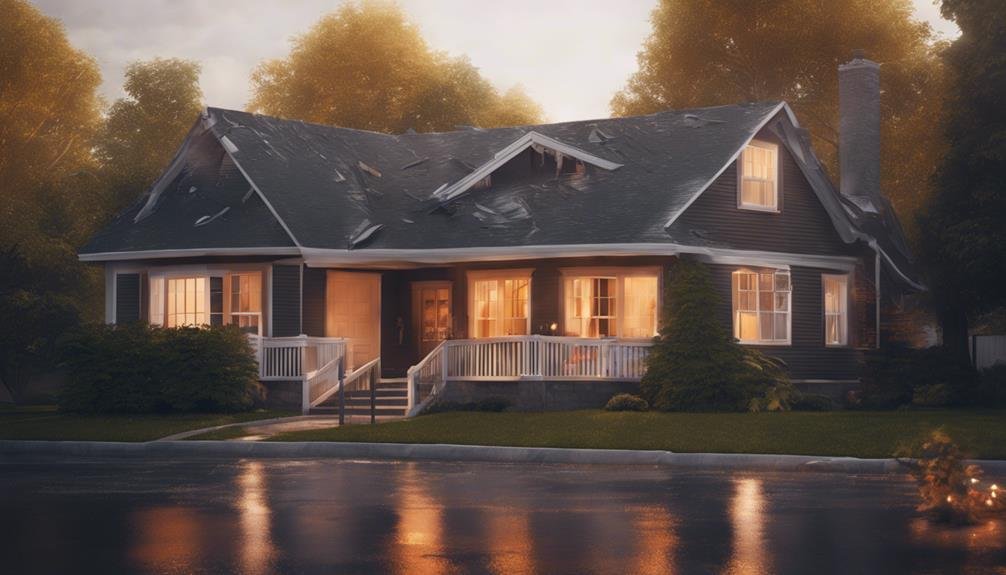Homeowners Vs. Renters Insurance
When considering homeowners versus renters insurance, note that homeowners insurance offers coverage for your home's structure and personal belongings, while renters insurance mainly focuses on personal property and liability. The flexibility to customize policies and the broader protection for homeowners make it worth exploring to confirm you have all-encompassing coverage for your needs. Understanding the differences in premiums and coverage options is crucial for making an informed decision that aligns with your budget and priorities. Make sure to assess your specific requirements to choose the best insurance option that suits your circumstances.
Key Takeaways
- Homeowners insurance covers the home structure; renters insurance covers personal belongings.
- Homeowners have more coverage customization options than renters.
- Renters insurance premiums are generally lower than homeowners insurance.
- Liability coverage is included in both homeowners and renters insurance.
- Understanding policy differences helps in choosing the best coverage for needs and budget.
Coverage Differences
When contrasting homeowners insurance with renters insurance, one key aspect to take into account is the differences in coverage provided by each type of policy. Homeowners insurance typically offers broader coverage variations compared to renters insurance. While both policies include personal property coverage, homeowners insurance often includes coverage for the physical structure of the home and other structures on the property.
On the other hand, renters insurance focuses mainly on personal property coverage and liability protection.
Policy customization also plays a significant role in the coverage comparisons between homeowners and renters insurance. Homeowners have the flexibility to customize their policies by adding endorsements for specific items or risks, such as jewelry or earthquakes. In contrast, renters may have fewer options for policy inclusions, as the coverage is primarily focused on personal belongings and liability.
Understanding these coverage differences and policy customization options is vital when deciding between homeowners and renters insurance to make sure you have the appropriate coverage for your needs.
Property Protection
When it comes to property protection in homeowners versus renters insurance, understanding the impact of ownership on coverage is important. Homeowners insurance typically offers more extensive coverage for the property you own, while renters insurance has limitations when it comes to protecting the landlord's property.
It's important to take into account these differences to guarantee that your assets are adequately protected based on your living situation.
Ownership Impact on Coverage
Owning a home directly impacts the level of coverage provided by your insurance policy, especially when it comes to property protection. As a homeowner, you have the advantage of greater control and customization over your insurance coverage compared to renters. Here's how ownership status influences your insurance protection:
- Ownership Impact: Homeowners have the ability to customize their coverage based on their property's specific needs. This customization can include adding endorsements for high-value items or increasing coverage limits for certain risks.
- Coverage Flexibility: Homeowners insurance policies typically offer more flexibility regarding coverage options and limits. You can tailor your policy to adequately protect your home, belongings, and personal liability based on your individual circumstances.
- Ownership Status: Being a homeowner often means having higher coverage limits and more detailed protection for your property. This reflects the higher investment and potential risk associated with owning a home compared to renting.
Renters Policy Limitations
When considering property protection, renters insurance policies come with inherent limitations that may impact the level of coverage you receive. It's essential to understand the coverage restrictions and policy exclusions that are common in renters insurance.
One important limitation to be aware of is that renters insurance typically doesn't cover the physical structure of the building you're renting. This means that any damage to the actual building, such as the walls, roof, or foundation, wouldn't be covered under your renters policy.
Additionally, there are often limitations on high-value items like jewelry, art, or electronics. If you have valuable items that exceed the policy limits, you may need to purchase additional coverage or a separate policy to adequately protect them.
Policy exclusions, such as damage from floods or earthquakes, are also important to note, as these events wouldn't be covered under a standard renters insurance policy.
Understanding these limitations and exclusions can help you make informed decisions about your coverage needs.
Liability Coverage
When comparing homeowners versus renters insurance, it's essential to understand the significance of liability coverage. This type of insurance provides protection in case someone is injured on your property or if you accidentally damage someone else's property.
Liability coverage not only covers property damage but also safeguards you against personal injury claims, offering you peace of mind in times of unexpected accidents.
Coverage for Property Damage
Your liability coverage in homeowners or renters insurance provides financial protection in case someone gets injured on your property or if you accidentally damage someone else's property. This coverage is vital in safeguarding you from potential legal and financial consequences that may arise from such situations.
- Water Damage and Fire Protection: Your policy may cover damages caused by water leaks, burst pipes, or fire incidents, ensuring that you have the necessary support to repair or replace the affected property.
- Natural Disasters: In the event of natural disasters like earthquakes, hurricanes, or tornadoes, your insurance can help cover the costs of repairing or rebuilding your property, offering a sense of security during challenging times.
- Theft Prevention: Homeowners and renters insurance often include coverage for stolen or damaged belongings due to theft, providing you with peace of mind knowing that your possessions are protected.
Having extensive coverage for property damage ensures that you're prepared for unexpected events and can mitigate potential financial burdens that may arise from property-related incidents.
Protection Against Personal Injury
To protect yourself against potential financial liabilities from personal injuries that occur on your property, having liability coverage in your homeowners or renters insurance is essential. Accidents like accidental falls can happen unexpectedly, and if someone gets injured while at your residence, you could be held liable for their medical expenses and other related costs. Liability coverage provides you with legal protection in such situations, ensuring that you're financially safeguarded.
Having liability coverage in your homeowners or renters insurance not only offers financial protection but also gives you peace of mind. It can help cover legal expenses if you're sued due to a personal injury that occurred on your property, saving you from significant out-of-pocket expenses.
Additional Living Expenses
When faced with a covered loss that renders your home uninhabitable, your insurance policy may include coverage for additional living expenses. This coverage is designed to alleviate the financial burden of having to find temporary accommodations while your home is being repaired or rebuilt.
Here are some key points to keep in mind regarding additional living expenses coverage:
- Policy exclusions: It's important to review your policy to understand any specific exclusions that may limit coverage for certain scenarios.
- Reimbursement options: Different policies offer varying reimbursement options for additional living expenses. Make sure you're aware of the reimbursement process and any limits that may apply.
- Coverage extensions: Some insurance policies may offer coverage extensions that provide additional benefits for certain situations, such as prolonged displacement.
Policy Costs
When evaluating homeowners and renters insurance, it's crucial to take into account the key points of premium differences and coverage variances.
Premiums for homeowners insurance are typically higher due to the increased coverage for the structure of the home, while renters insurance focuses more on personal belongings.
Understanding these differences can help you make an informed decision on which policy best suits your needs and budget.
Premium Differences
Homeowners insurance typically comes with higher premiums compared to renters insurance due to the increased coverage and higher property value associated with owning a home. When considering the premium differences between these two types of insurance, several factors come into play:
- Premium Factors: Homeowners insurance premiums are influenced by factors such as the location of the property, the age of the home, and the construction materials used. Renters insurance premiums are generally lower as they mainly cover personal belongings and liability.
- Policy Inclusions: Homeowners insurance policies often include coverage for the physical structure of the home, personal property, liability protection, and additional living expenses in case of a covered loss. On the other hand, renters insurance primarily covers personal property, liability, and additional living expenses.
- Coverage Customization: Homeowners have the flexibility to customize their coverage to suit their specific needs, which can affect the premium costs. Renters may have fewer customization options since they don't own the property.
Understanding these differences in premiums and policy inclusions is essential for making informed decisions about insurance coverage, as it can have significant financial implications in the event of a claim.
Coverage Variances
Consider the significant differences in policy costs between homeowners and renters insurance. While renters insurance is generally more affordable than homeowners insurance due to covering personal belongings rather than the structure itself, there are variances in coverage that impact costs. Renters insurance tends to have lower premiums because it typically doesn't cover the physical structure, resulting in lower replacement costs in case of damage.
Homeowners insurance, on the other hand, covers both the structure and personal belongings, leading to higher premiums. The coverage exclusions in homeowners insurance may also contribute to higher costs, as they often include specific limitations on certain types of damages or losses. Claim disputes are more common in homeowners insurance due to the higher value of claims, potentially leading to increased policy costs.
Policy renewals and coverage upgrades are factors that can affect the costs of both homeowners and renters insurance. Homeowners may see increases in premiums upon policy renewal, especially after filing claims or experiencing property damage. Similarly, renters may face higher costs if they opt for additional coverage upgrades to protect valuable items not included in standard policies.
Understanding these coverage variances is essential in determining the most suitable insurance option for your needs.
Coverage Limits
To ensure you have sufficient protection for your property and belongings, it's essential to comprehend the coverage limits of your insurance policy. Understanding what your insurance policy covers and up to what extent can prevent future financial burdens in case of unexpected events.
Here are some key points to take into account:
- Coverage Exclusions: Be aware of what your policy doesn't cover. Understanding the exclusions can help you plan for additional coverage if needed.
- Policy Enhancements: Explore options for enhancing your policy. You may have the opportunity to add specific coverage enhancements to better protect your assets.
- Insurance Requirements: Familiarize yourself with the insurance requirements set by your insurer. Failure to meet these requirements could result in limitations to your coverage.
Deductibles Comparison
Understanding the deductible variances between homeowners and renters insurance policies can greatly impact your financial responsibility in the event of a claim. Deductible options in homeowners insurance typically range from $500 to $2,000 or more, while renters insurance deductibles can be as low as $250. The deductible you choose directly affects your policy's cost, with higher deductibles usually leading to lower premiums.
When considering deductible requirements, renters insurance generally has lower thresholds compared to homeowners insurance. This means that as a renter, you might be responsible for a smaller upfront cost in the event of a claim. However, keep in mind that a lower deductible often results in higher premium payments.
In terms of the claim process, understanding how your deductible impacts the payout is important. With homeowners insurance, the deductible is subtracted from the total claim amount, whereas in renters insurance, you typically pay your deductible upfront before receiving any reimbursement.
Choose a deductible that strikes a balance between cost impact and financial security.
Claim Process
When filing a claim for either homeowners or renters insurance, it's important to understand the specific process involved to guarantee a smooth and efficient resolution. To successfully navigate the claim process, keep in mind the following key points:
- Documentation Requirements
- Make sure you have all necessary documentation such as receipts, photos of the damaged property, and any relevant contracts or agreements.
- Keep a detailed record of all communication related to the claim, including emails, phone calls, and letters exchanged with the insurance company.
- Communication with Adjusters
- Be proactive in providing information requested by the insurance adjuster promptly.
- Maintain open and transparent communication throughout the process to address any concerns or questions that may arise.
Personalization Options
When exploring insurance options for your residence, consider the various ways you can personalize your coverage to align with your specific needs and preferences. Personalization options in insurance policies allow you to tailor your coverage to suit your individual circumstances.
Policy customization enables you to add or remove specific coverage options based on what matters most to you. For homeowners, this could mean including additional coverage for expensive jewelry or artwork, while renters might opt for coverage that includes protection for their personal belongings in case of theft or damage.
When selecting your insurance policy, take the time to review the personalization options available to make sure that you're adequately covered in all areas that are important to you. Whether it's adding coverage for natural disasters, personal liability protection, or specific endorsements for high-value items, customizing your policy can provide you with peace of mind knowing that you're prepared for any unforeseen events that may occur.
Choosing the Right Policy
To guarantee extensive coverage that aligns with your specific needs, it's vital to carefully select the right insurance policy for your residence.
When choosing the right policy, consider the following key aspects:
- Policy customization: Look for insurance providers that offer customizable policies, allowing you to tailor coverage to suit your individual requirements. This ensures that you aren't paying for unnecessary coverage while still safeguarding your most valuable assets.
- Coverage comparison: Compare the coverage options of different policies to determine which one offers the most thorough protection for your home and belongings. Pay close attention to details such as liability coverage, personal property protection, and additional living expenses coverage.
- Policy endorsements: Explore the endorsements available with each policy, as these can provide additional protection for specific items or events not covered in a standard policy. Endorsements allow you to enhance your coverage based on your unique circumstances and preferences.
Frequently Asked Questions
Can I Get Insurance for Both My Home and Belongings as a Renter?
As a renter, you can obtain insurance for your belongings, but not for the home itself, as that falls under your landlord's requirements. Consider cost comparison between renters and homeowners insurance to guarantee adequate coverage.
Does Renters Insurance Cover Damage Caused by My Pet?
When it comes to your furry friend, renters insurance can offer pet liability coverage for damage they cause. However, be aware of exclusions and limitations that may apply, ensuring you have the right protection in place.
Are My Personal Belongings Covered Outside of My Home?
Yes, your personal belongings can be covered outside of your home with renters insurance. It includes travel coverage for theft protection. However, be mindful of coverage limits, and consider additional policies for high-value items to guarantee full protection.
Will Homeowners Insurance Cover Damages From Natural Disasters?
When it comes to natural disasters, homeowners insurance typically covers damages from fires, lightning strikes, windstorms, and hail. However, for specific events like floods or earthquakes, additional coverage such as flood insurance or earthquake protection may be necessary.
Can I Get Liability Coverage for Accidents Caused by My Child at Home?
Yes, you can obtain liability coverage for accidents caused by your child at home. It's important to guarantee proper child supervision to prevent neighbor disputes. This coverage can protect you financially in case of unforeseen incidents.
Conclusion
In the battle of homeowners vs. renters insurance, remember that protection is like armor for your home. Homeowners insurance provides a fortress for your property and belongings, while renters insurance shields your personal possessions within the walls of your rented space.
Choose wisely, as the right policy can be your shield against unforeseen dangers and unexpected calamities. Make sure to armor up with the best insurance coverage for your unique needs.








